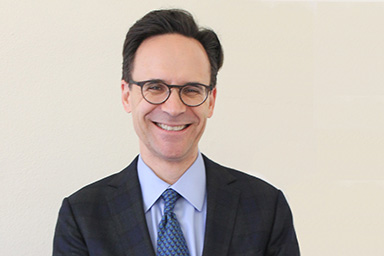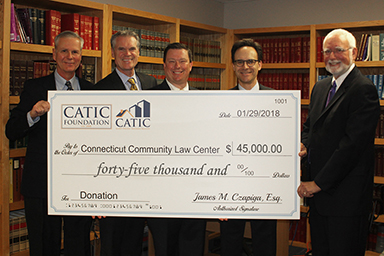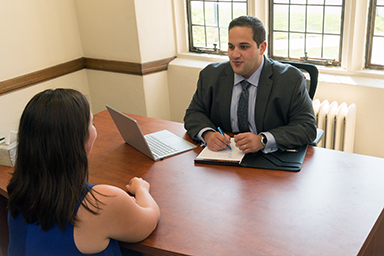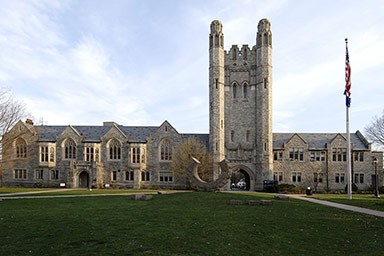
Mark Schreier, director of the Connecticut Community Law Center at UConn School of Law, has been honored with the 2018 Liberty Bell Award from the Hartford County Bar Association.
The association presents the award annually to a lawyer or non-lawyer who has promoted a better understanding of the rule of law, encouraged greater respect for law and the courts, stimulated a sense of civic responsibility, or contributed to good government in the community.
Schreier, a former civil litigator specializing in catastrophic injury claims and insurance law, is the founding director of the Connecticut Community Law Center, a legal “incubator” that supports new lawyers as they launch solo practices. The lawyers serve clients who don’t qualify for legal aid but can’t afford standard legal fees, providing legal services at a modest cost through such means as limited-scope representation and unbundled services.
The center, which began operation in 2017 in cooperation with the Hartford County Bar Association, has provided more than 500 individuals and families with legal services. Its work is supported by the UConn Foundation and generous donors, including CATIC, the title insurance underwriter.
Schreier said the incubator’s success is the result of collaborative effort. “The UConn School of Law, the Hartford County Bar Association, the new attorneys who have opened solo practices at the CCLC and the experienced attorneys who have trained and mentored them – all contributed to the program’s success,” he said. “Their combined efforts have provided members of our community with a voice of advocacy and support so that they, too, may participate in an essential element of our country’s democracy.”
UConn Law Dean Timothy Fisher accepted the award on Schreier’s behalf at the association’s annual Law Day ceremony on May 4, 2018.
 CATIC, the title insurance underwriter, has pledged $45,000 to support the Connecticut Community Law Center, which offers legal services to low- and moderate-income clients.
CATIC, the title insurance underwriter, has pledged $45,000 to support the Connecticut Community Law Center, which offers legal services to low- and moderate-income clients. After Judy Bakowski moved to Arizona, she kept trying to transfer ownership of her house in Connecticut to her daughter. They even drew up a quitclaim deed and had it notarized, but they kept running into a tangle of red tape.
After Judy Bakowski moved to Arizona, she kept trying to transfer ownership of her house in Connecticut to her daughter. They even drew up a quitclaim deed and had it notarized, but they kept running into a tangle of red tape. A new incubator at UConn School of Law will provide affordable legal services to people who need them and help lawyers establish solo practices.
A new incubator at UConn School of Law will provide affordable legal services to people who need them and help lawyers establish solo practices.